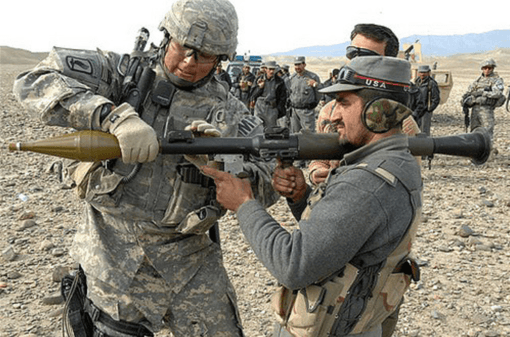
Photo by The U.S. Army | CC by 2.0
Donald Trump spent about as much time being an isolationist as he did worrying about being in the military during the Vietnam War. Many, including some unhappy Democrats, kept a jaundiced eye on Trump during the 2016 presidential campaign and thought that he just might reduce U.S. military hegemony across the globe.
These were semi-delusional thoughts. The military-industrial-financial complex calls the tune in the U.S. with trillions of dollars at stake in keeping between 700 and 1,000 active military bases around the world and endless wars going in an Orwellian nightmare come true.
Here’s Politico’s assessment of the number of foreign military bases the U.S. had in 2015:
Despite recently closing hundreds of bases in Iraq and Afghanistan, the United States still maintains nearly 800 military bases in more than 70 countries and territories abroad—from giant “Little Americas” to small radar facilities. Britain, France and Russia, by contrast, have about 30 foreign bases combined (“Where in the World Is the U.S. Military?,” Politico, July/August 2015).
Talk about unbridled militarism! As was common wisdom during the Vietnam era, the U.S. is policeman to the world.
The cheerleaders of a dystopian society now rule, and the rest is history, so to speak. Media outlets such as the New York Times and the Washington Post, aided by neoliberal media giants CNN and MSNBC produce the desired results. We are always either at war or preparing for war. Even mass murder on the streets of the U.S., most recently in Las Vegas and New York, take a backseat and work their way into the dustbin of history to a degree.
The Authorization for Use of Military Force, passed by Congress after the attacks of September 2001 with only one dissenting vote, by Representative Barbara Lee D-California, is still in force. This is dangerous territory with the warmonger Trump in charge.
So, it is no surprise that many Democrats roll over on issue of war. Max Blumenthal reports that “Two years of non-stop red-bating, Russia hysteria, and fearmongering over North Korea have done the trick, particularly among Democrats” (“Americans pushed into pro-war frenzy by elite-controlled MSM & NATO – Max Blumenthal,” RT, October 8, 2017).
Some in the U.S. have a short historical memory. NATO has been creeping up to Russia’s doorstep since the official end of the Cold War and Soviet Union in 1991. It didn’t take the Allies long to jettison the Soviet Union following World War II. Rather than forge a lasting peace with a nation that had suffered 20,000,000 military and civilian deaths during the war, and stopped the Nazi war machine in its tracks, hostilities began almost immediately at the war’s end.
North Korea is one example of how the Cold War distorted relations among nations following World War II. Split apart by colonial powers both before and after the world war, North Korea was yet another hot flashpoint in the rivalry between the former Allies. It was one among many global killing fields, with nearly 5 million dead by the war’s end in 1953.
The RT article cited above states:
A recent study by the Chicago Council on Global Affairs has pointed at a shift in the collective thinking and feeling of Americans, when it comes [to] how they view global conflict… Americans seem to have found a new appetite for war.
The latter comes as no surprise to those on the antiwar left who followed the years of quiet militarism during the presidency of Barack Obama. Those who had been antiwar during the Bush II administration, and especially following the disastrous 2003 invasion of Iraq, fell into line and were silenced during the regime of “hope and change.”
The entire world has been turned into a kind of chessboard battlefield where the laws of war, developed over thousands of years, mean nothing at all to the aggressors. Civilian life means little and civility is a quaint and ancient value to be cast aside. With Trump itching to attack Iran, and with pockets of war extended over the continent of Africa, even a casual observer can see where all of this is leading. The ruling elite often don’t choose well among those they place in power. That scenario has kept us all at the edge of a catastrophe of grotesque proportions with a better than even chance of it all ending badly.
The Watson Institute at Brown University published “Costs Of War,” documenting “US Budgetary Costs of War through 2016: $4.79 Trillion and Counting.” Here readers can see how additional tax cuts for the wealthy elite will not affect military spending, but will instead rip the heart out of what’s left of social programs of human uplift as deficits spiral out of control.